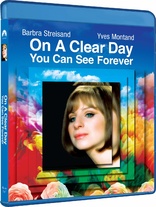On a Clear Day You Can See Forever Blu-ray Movie
HomeOn a Clear Day You Can See Forever Blu-ray Movie 
Paramount Pictures | 1970 | 129 min | Rated G | May 26, 2020Movie rating
6.8 | / 10 |
Blu-ray rating
| Users | 2.5 | |
| Reviewer | 3.0 | |
| Overall | 2.5 |
Overview
On a Clear Day You Can See Forever (1970)
Daisy Gamble, an unusual woman who hears phones before they ring, and does wonders with her flowers, wants to quit smoking to please her fiancé, Warren. She goes to a doctor of hypnosis to do it. But once she's under, her doctor finds out that she can regress into past lives and different personalities, and he finds himself falling in love with one of them.
Starring: Barbra Streisand, Yves Montand, Bob Newhart, Larry Blyden, Simon OaklandDirector: Vincente Minnelli
| Romance | Uncertain |
| Musical | Uncertain |
| Comedy | Uncertain |
Specifications
Video
Video codec: MPEG-4 AVC
Video resolution: 1080p
Aspect ratio: 2.35:1
Original aspect ratio: 2.35:1
Audio
English: DTS-HD Master Audio 5.1 (48kHz, 24-bit)
English: Dolby Digital 2.0 Mono (192 kbps)
Subtitles
English
Discs
Blu-ray Disc
Single disc (1 BD)
Playback
Region free
Review
Rating summary
| Movie | 3.0 | |
| Video | 3.0 | |
| Audio | 4.0 | |
| Extras | 0.0 | |
| Overall | 3.0 |
On a Clear Day You Can See Forever Blu-ray Movie Review
Reviewed by Jeffrey Kauffman June 10, 2020 Note: Paramount is releasing several older films which are being released on BD-R through Amazon, but which are reportedly (based on
our Forum) available as pressed discs from other retailers. This review disc came from Amazon, and our link points to Amazon, so the spec states
BD-R.
Burton Lane is a name that is not widely recognized outside of certain demographics who like musical theater and/or musical films. Lane had a
long
and successful career, and he may forever be thanked irrespective of any of his own musical accomplishments as the reported “discoverer” of a
little
girl soon to be renamed Judy Garland. Lane didn’t have a “hit a year” Broadway career like some of his contemporaries, but his melodic skills
meant that several of his compositions from his two best remembered musicals have long been enshrined
in
the Great American Songbook as all time classics. Lane’s relative anonymity may have had
insult
added to injury due to the fact that those two best remembered musicals made it to the screen within just a couple of years of each other, albeit to
pretty lackluster critical response and (perhaps more importantly) box office returns. What is probably Lane’s biggest Broadway hit, Finian's Rainbow, had what is perhaps one of the
longest
gestation periods of any huge Great White Way hit to ultimately make it to the screen. Finian’s Rainbow opened on Broadway in January
of
1947, immediately becoming a total smash and running for several seasons, but nonetheless not receiving its film adaptation until over two
decades
later, in 1968 (in a version famously directed by Francis Ford Coppola in the relatively early days of his career). On a Clear Day You Can See
Forever , Lane's second most successful stage musical, at least didn’t have to wait quite that long to make its transition from stage to screen.
While somewhat less of a sensation than Finian's Rainbow when it opened in 1965, it ironically became a film only around five years later
in 1970 (helmed by legendary musical director
Vincente
Minnelli in the relatively late days of his career).
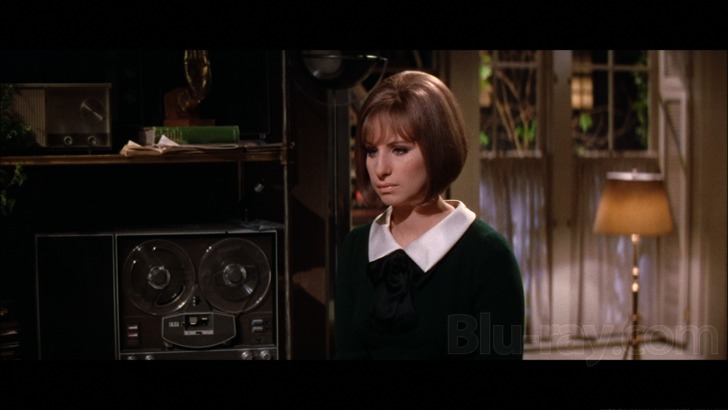
The two leading teams in musical theater in the 1950s into the early 1960s were undoubtedly Richard Rodgers and his partner Oscar Hammerstein II, and Frederick Loewe and his partner Alan Jay Lerner. Both the Rodgers and Hammerstein as well as the Lerner and Loewe collaborations came to an end at the beginning of the 1960s, with Hammerstein’s death in 1960 and Loewe’s “retirement” at around the same time. (Fans will know that Lerner and Loewe “reunited” later to recraft the music and lyrics for the stage adaptation of Gigi, and then to write the song score for the film musical The Little Prince). Both teams had pretty significant hits to “go out” on, with The Sound of Music winning the Tony for Best Musical in 1960 for Rodgers and Hammerstein, and Lerner and Loewe's Camelot taking home several prizes the next year, albeit not the Best Musical trophy (for which it didn’t even wrest a nomination, perhaps surprisingly).
That meant that by circa 1960-61, Richard Rodgers and Alan Jay Lerner were suddenly looking for new partners, a situation which would actually continue to plague them for much of the rest of their careers. In late October 1962, however, it seemed (for a while at least) that a new “marriage” of titans had come to pass when a Rodgers-Lerner collaboration called I Picked a Daisy was announced. By July 1963, however, Rodgers had bowed out and reports started surfacing that Burton Lane had signed on for the show, which was being promoted as a “psychic ESP” enterprise, albeit with singing and dancing.
Already it would seem that this show, which ultimately became On a Clear Day You Can See Forever, was undergoing a pretty troubled developmental period, and that continued unabated for another couple of years, until the Broadway show opened in October of 1965. The title had obviously changed, stars had come and gone, the concept had been tweaked to include reincarnation, and while on opening night critics were in love with ultimate leading lady Barbara Harris and much of the score, the show itself was met with a fairly tepid response, though it managed to make it through the rest of the season.
This history is given to indicate that On a Clear Day You Can See Forever may have had some intrinsic "issues" which even the likes of Barbra Streisand and Vincente Minnelli couldn't completely overcome. The basic setup of the film is that a neurotic soon to be married woman named Daisy Gamble (Barbra Streisand) discovers she is able to be almost instantly hypnotized when she wanders into a class led by college professor Marc Chabot (Yves Montand). (Daisy has a few other "talents" such as being psychic and also being able to make flowers grow almost magically fast.) Daisy desperately wants to quit smoking in order to please her nerdy fiancé Warren Pratt (Larry Blyden), and Marc agrees to help her with her problem. Marc is stunned to find out that when he puts Daisy “under” and regresses her, she actually goes back before her birth as Daisy to divulge that she had had a previous life as a late 18th and early 19th century woman named Melinda. Things start to get complicated when Marc begins falling for Melinda, unbeknownst to the hypnotized Daisy.
Much as he had done with the previous year’s film adaptation of Lerner and Loewe’s Paint Your Wagon, Alan Jay Lerner penned the screenplay for On a Clear Day You Can See Forever, and also as Lerner did with Paint Your Wagon, he made wholesale changes to both the stage libretto and score in the adaptation. ( Paint Your Wagon was another musical with an almost absurdly long time between its stage opening in 1951 and its ultimate film adaptation in 1969.) Daisy’s previous life as Melinda is pretty much completely retooled for the movie version, and quite a few of the songs from the Broadway score didn’t make the journey to celluloid. Perhaps most strangely, Lerner added a completely unnecessary stepbrother for Daisy, played rather improbably by that great musical theater artist Jack Nicholson.
The result is an occasionally engaging but never really thrilling musical, one that is intentionally nowhere near as “gargantuan” as Streisand’s immediately prior stage to screen outing Hello, Dolly! . Lane's winning melodies, which include the well remembered title song and other standards like Hurry, It's Lovely Up Here and Come Back to Me, as well as some of Lerner's more clever lyrics, provide most of the pleasure here. I'm assuming that Lerner and Lane wrote some new songs for the film, including the charming "duet" Go to Sleep (that Streisand sings with herself), in order to try to get a Best Song nomination, a gambit that failed (the film received no nominations at all, not even for the rather stunning period costumes by the legendary Cecil Beaton).
On a Clear Day You Can See Forever Blu-ray Movie, Video Quality 
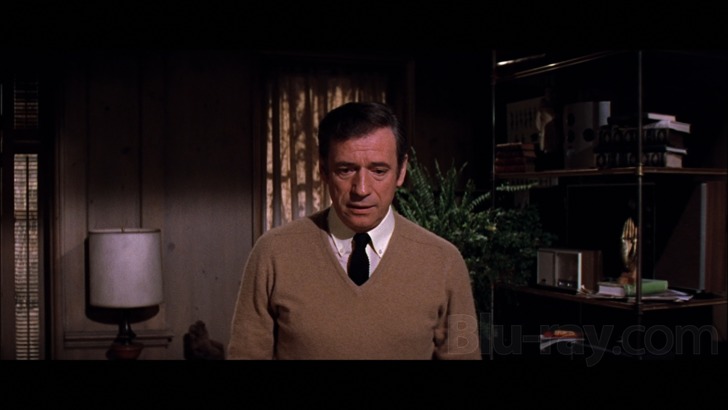
On a Clear Day You Can See Forever is presented on Blu-ray courtesy of Paramount Home Video with an AVC encoded 1080p transfer in
2.35:1 (on a BD-R*). The fact that this is coming out in this format may indicate as well as anything that it doesn't look like significant restoration
of any kind has been done. As such, there are quite a few signs of age related wear and tear, including quite a few scratches (you can see one in
screenshot 19), as well as numerous flecks and speckling. There are also some pretty rough patches, most notably the big finale with Yves Montand on
top of the Pan Am building singing Come Back to Me , in a sequence Minnelli obviously modeled on the finale of Funny Girl (several of Streisand's costumes, notably the huge hats she wears, are also
seemingly designed to evoke that film). The opening time lapse photography has some probably unavoidable flicker (something that has been evident
on all previous home video releases of this film that I've personally seen). While there are some variations in densities and saturation, for the most
part the palette is one of the
strengths of this transfer, with some really lush tones, especially in the "flashback" (i.e., previous life) sequences. Detail levels are generally
commendable, even in some midrange framings, though some sections are rather soft looking. Grain looks natural for the most part, but this film is
littered with opticals, and as such several scenes, notably some transitions, can look pretty gritty.
*Our knowledgeable Forum members are reporting that only orders from Amazon (which my review disc came from) are being issued on BD-R.
On a Clear Day You Can See Forever Blu-ray Movie, Audio Quality 
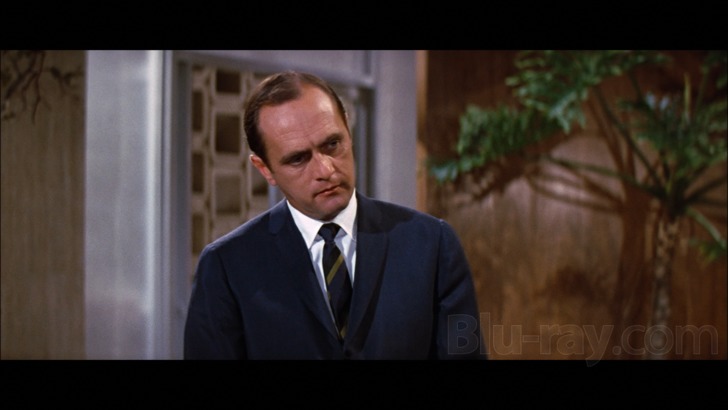
On a Clear Day You Can See Forever features a DTS-HD Master Audio 5.1 track that offers a nice spacious accounting of the score, though I occasionally found some of the vocals to be a bit buried in the mix. There is occasional surround engagement courtesy of some ambient environmental sounds like the traffic noises that are suddenly present late in the film when Daisy and Marc have a showdown on her roof terrace. Dialogue is delivered cleanly for the most part, but Montand's pretty heavy accent may be an impediment for some listeners (there are optional English subtitles for those who need a little help). I noticed a few sync issues which don't seem to be as prevalent on the Dolby Digital 2.0 mono track.
On a Clear Day You Can See Forever Blu-ray Movie, Special Features and Extras 
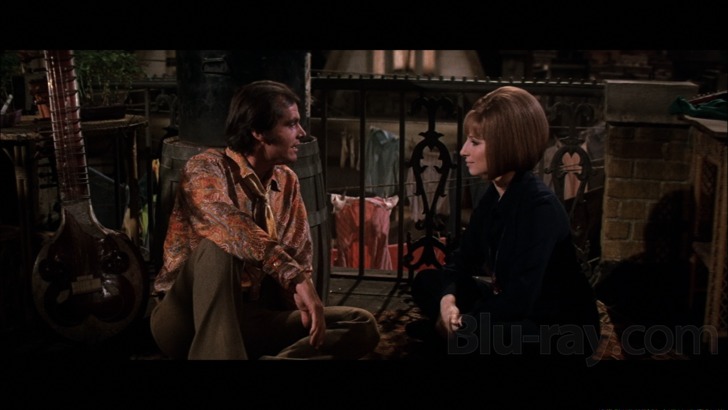
This is a bare bones BD-R* from Paramount without any supplemental features, though at least there is a Main Menu (see screenshot 20).
On a Clear Day You Can See Forever Blu-ray Movie, Overall Score and Recommendation 
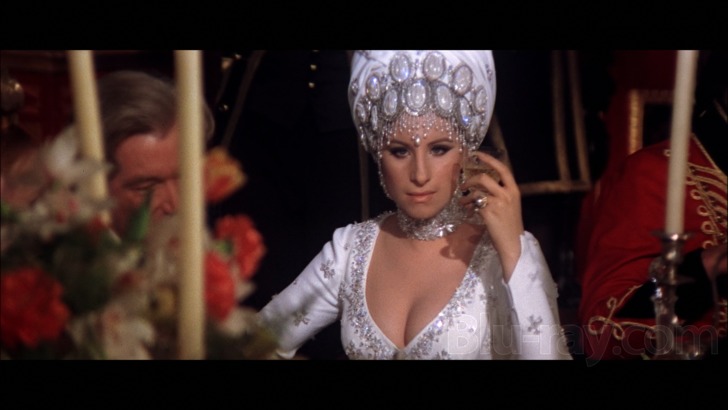
I had the great pleasure of Music Directing the original stage version of On a Clear Day You Can See Forever a couple of years ago as part of a curated series that presents little remembered or outright flop musicals. We were able to obtain a number of interesting songs that were either part of the original show, but dropped and/or replaced during its run, or in fact some of the replacements, and the mere fact that such songs were dropped and/or replaced probably lends credence to the idea that even Burton Lane and Alan Jay Lerner may have felt the property needed "tweaking" even after it opened and was a reasonable success, if not an outright smash hit. Unfortunately, Lerner's "revisionist" tendencies probably didn't help this film version of the musical, and even more unfortunately, Vincente Minnelli just didn't seem to be able to find the "magic" in the tale, despite everything from reincarnation to ESP being part of the proceedings (there are some stabs at innovation here, like starting the film with a song pre-credits). The score is still lovely and the film does offer the sumptuous orchestrations and underscore of Nelson Riddle (listen to how skillfully he deconstructs Melinda as underscore when Daisy starts to remember her previous life for the first time), but this On a Clear Day may be a bit on the dreary side despite the best efforts of some ace performers and technicians. Revisions of On a Clear Day You Can See Forever continued even after the death of Lerner, and those interested may want to look into the Broadway revival which co-starred Harry Connick, Jr. a few seasons ago, as it made some substantial changes which won't be spoiled here, other than to say that even those changes weren't able to make the revival a success. Fans of Streisand or the score may want to check this out, and this release features improvable video and solid audio, for those who are considering a purchase.
Similar titles
Similar titles you might also like

The Pirate
Warner Archive Collection
1948

Let's Make Love
Limited Edition to 3000
1960

Frankie and Johnny
1966

Viva Las Vegas
50th Anniversary
1964

Flower Drum Song
1961

Hello, Dolly!
Fox Studio Classics
1969

A Star Is Born
1976

Second Chorus
Swing Romance
1940

What a Way to Go!
1964

Hello, Frisco, Hello
Limited Edition
1943

Glee: The Complete First Season
2009-2010

Footlight Parade
Warner Archive Collection
1933

The Broadway Melody
Warner Archive Collection
1929

Funny Girl 4K
1968

Three Little Words
Warner Archive Collection
1950

Camelot
45th Anniversary Edition
1967

Finian's Rainbow
Warner Archive Collection
1968

On Moonlight Bay
Warner Archive Collection
1951

Bells Are Ringing
Warner Archive Collection
1960

Girl Crazy
Warner Archive Collection
1943
